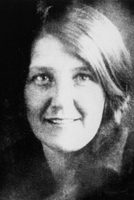Nina Gagen-Torn facts for kids
Quick facts for kids
Nina Gagen-Torn
|
|
|---|---|
 |
|
| Born | Saint Petersburg, Russian Empire |
| Died | Leningrad, Soviet Union |
Nina Gagen-Torn (Russian: Ни́на Ива́новна Га́ген-То́рн; December 15, 1900 — June 4, 1986) was a talented Russian and Soviet writer, poet, and historian. She was also an ethnographer, which means she studied different cultures and peoples. Much of her work focused on the people of the Soviet Union, Russian and Bulgarian folk stories, and the history of studying cultures in Russia.
About Nina Gagen-Torn
Nina Gagen-Torn was born in Saint Petersburg, Russia. Her family was noble, meaning they had a high social rank. Her father, Ivan Eduardovich Gagen-Torn, was a doctor and had Swedish roots.
She studied at the Petrograd Institute of Geography and later continued her studies at the Petrograd University in 1924. She worked as a lecturer and at the Museum of Ethnography. She was also the secretary for a magazine called Soviet Ethnography in 1934.
Challenges in Her Life
During a difficult time in history, Nina Gagen-Torn faced many challenges. From 1936 to 1942, she was sent to special camps in Kolyma. After that, she lived in exile from 1942 to 1943.
In 1946, she earned a special academic degree in ethnography. Her research was about the clothing of people living near the Volga River. This helped her understand how different groups of people developed.
However, she was again sent away from 1947 to 1952, this time to Mordovia. After this, she was permanently sent to Yenisey. When the difficult period in Soviet history ended, she was officially pardoned on April 16, 1954. By 1956, her name was completely cleared.
Her Important Work
From 1964, Nina Gagen-Torn spent her time studying The Tale of Igor's Campaign. This is a very old and famous story from Russia. She came up with many new ideas about it.
Most of her research was about the cultures of people in the Soviet Union. She also studied Russian and Bulgarian folk stories. She was very interested in the history of how people studied different cultures in Russia.
Besides her research, Nina Gagen-Torn also wrote short stories and poems. Two books of her poems were published after she passed away.
 | Audre Lorde |
 | John Berry Meachum |
 | Ferdinand Lee Barnett |

